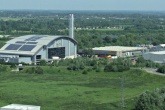SUEZ opens new EfW plants in Wilton and Cornwall
Waste management company SUEZ recycling and recovery UK has officially opened two new state-of-the-art Energy from Waste (EfW) plants in Cornwall and Wilton in Redcar.
In partnership with Cornwall Council and the Merseyside Recycling and Waste Authority (MRWA), SUEZ marked the official opening of the Cornwall Energy Recovery Centre and the Wilton EfW facility in Redcar with events at the Redcar facility last Thursday (14 June) and at the Cornwall facility on Friday (15 June). The two facilities join SUEZ’s Severnside facility in West London as projects to have been successfully developed and commissioned in the past two years.
The Wilton facility was opened by MRWA Deputy Chairperson, Cllr Tony Concepcion and SUEZ UK CEO, David Palmer-Jones, in recognition of the work carried out by the two organisations in managing household waste in the merseyside and Halton area.

The new facility has an annual capacity of 240,000 tonnes of waste and will see waste that would have been sent to landfill converted into 20 megawatts of electricity – enough to power up to 63,000 homes – while steam generated is also exported to local industries on the Wilton International Industrial Estate, where the facility is located.
Residual waste from Merseyside and Halton arrives at the Knowsley Rail Transfer Loading Station on Merseyside – operated by SUEZ – where it is sent by rail container to the Wilton facility. According to SUEZ, transporting residual waste by rail saves the equivalent of 1,000 HGV journeys and offsets around 127,000 tonnes of CO2 each year.
Commenting on the opening, MRWA Deputy Chairperson, Cllr Tony Concepcion, said: “It’s been a long process for the Authority to ensure that this facility and the contract for Merseyside and Halton’s waste are both value for money and the most sustainable option for our taxpayers for many years to come. We’d like to thank Merseyside Energy Recovery Limited, SUEZ and all of the many other partners, contractors and sub-contractors who have contributed to getting us to this point today.”
Meanwhile, In Cornwall on Friday, representatives from Cornwall Council and SUEZ were joined by members of the community for the official opening of the Cornwall facility, which has an annual capacity of 450,000 tonnes of waste.
The opening event showcased some of the projects that were awarded grants by the St Dennis and Nanpean Community Trust. Established to serve the communities around the energy recovery centre, the trust receives a percentage of the revenue from the energy generated by the facility together with funding from Cornwall Council. To date, over £370,000 have been awarded to local community projects.

At the event, SUEZ and Cornwall Council also announced the publication of ‘Managing Cornwall’s household waste’, its first annual report on how the organisations are working together towards the priorities laid out in Cornwall’s Environmental Growth Strategy. The report looks at initiatives from the past year geared towards helping Cornwall to re-use and recycle more of its waste and preserve its natural environment.
Sue James, Cornwall Council Portfolio Holder for Environment and Public Protection said: “Thank you to Cornwall Energy Recovery Limited, SUEZ and the other partners, contractors and sub-contractors who have worked together to deliver the facility, which has now had a successful first year of operations. We can celebrate that most of our residents’ household waste left over after all efforts have been taken to reduce, reuse and recycle is now used effectively – as a fuel to safely and sustainably generate a huge amount of electricity which is exported to the National Grid.”
David Palmer-Jones, Chief Executive Officer for SUEZ UK, added: “We are delighted to this week celebrate the official opening, and first year of successful operations, of the Wilton and Cornwall facilities. Complex infrastructure projects like these require the skills and dedication of many people to make them a reality, but equally the vision of politicians who are entrusted by their constituents to provide long term stable solutions for the waste generated.”
How much is enough capacity?
The opening of SUEZ’s two facilities comes amidst a significant amount of debate regarding the future of EfW in the UK and what role it has to play in the UK’s waste strategy.
The Environmental Services Association (ESA), which represents some of the largest UK waste management companies, many of which have invested heavily in EfW, released a report at the start of the month (6 June) entitled ‘Energy for the Circular Economy: An overview of Energy from Waste in the UK’, calling on the government to support the extension of EfW in the UK in order to save around 60 million tonnes of waste from landfill and save 12 million tonnes of CO2 by 2030.
Read more: How much is enough residual waste infrastructure?
However, the place of EfW in the circular economy has been brought into question in recent times, with a heated debate flaring up last summer regarding the UK’s domestic residual waste treatment capacity. EfW facilities provide the opportunity to recover energy from waste that would otherwise have been sent to landfill, placing this treatment option above landfill in the waste hierarchy, and has become one of the primary methods of treatment for the UK’s residual waste.
The UK is currently unable to treat all of the residual waste that arises in the UK each year domestically and so has to export a proportion of that to facilities in Northern Europe. Current treatment capacity stands at around 15 million tonnes plus around 3.5 million tonnes in refuse derived fuel (RDF) exports in relation to around 26 million tonnes of residual waste arising each year.
Following the release of Eunomia Research and Consulting's Residual Waste infrastructure Review at the start of last August, which stated that the UK would reach residual waste treatment overcapacity by 2020/21, with excess capacity increasing to 9.5 million tonnes by 2030/31 if all currently planned facilities were constructed, ESA Executive Director Jacob Hayler branded Eunomia’s report “flawed”, saying it had “been contradicted by report after report from everyone else” and risked allowing the UK to “sleepwalk” into a capacity shortfall.
This prompted a response from Eunomia that sought to reinforce its stance by releasing further figures backing up its original claims, prompting waste management companies Biffa and SUEZ to release their own reports warning of a residual waste treatment capacity gap.
EfW has also come under fire from other sources, with the Chief Scientist for the Department for Environment, Food and Rural Affairs (Defra) stating in February that more EfW infrastructure could harm recycling innovation, while the campaign group UK Without Incineration (UKWIN) launched its ‘Bin the Burners’ campaign in November last year, seeking a moratorium on new EfW infrastructure in the UK.










